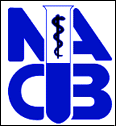Recommendations will be presented by an expert panel on the use of laboratory analytes for the diagnosis and management of patients with diabetes mellitus – Presented as an Edutrak session at the AACC’s 52nd Annual Meeting in San Francisco, July 23 –27, 2000.
Please note that the first draft of the guidelines now appears on this web site for your response and commentary in June 30, 2000.
Program Chair
David Sacks, M.B., Ch.B.
dsacks@rics.bwh.harvard.edu
3305 Guidelines & Recommendations for Laboratory Analysis in the Diagnosis & Management of Diabetes Mellitus
Moderator:
David Sacks, MB, ChB, Harvard Medical School & Brigham & Women's Hospital,
Boston, MA
Developed in cooperation with the National Association for Clinical Biochemistry
Level: Intermediate
CE Credit Hours: 1.5 (morning); 2.25 (afternoon)
Intended Audience:
This session is targeted to clinical pathologists, clinical chemists,
clinical laboratory scientists, laboratory managers, laboratory technologists,
and trainees in laboratory medicine.
Overview: It is estimated that more than 15 million Americans have
diabetes mellitus. The multiple cardiovascular, retinal, and renal complications
that result cause annual health care costs in excess of $92 billion. This
session will provide a critical evaluation of the analytes used in diagnosing
and monitoring diabetes, both type 1 and type 2. Recommended guidelines
will be outlined for antibodies, glucose, ketones, glycated proteins,
urinary albumin excretion, insulin, and other pertinent analytes. Whenever
possible, evidence-based guidelines will be presented. Adequate time will
be available for comments from the audience on the proposed recommendations
for developing clinically useful guidelines.
Expected Outcomes: At the conclusion of this session, participants
will be able to 1) identify analytes that are clinically useful in the
management of patients with diabetes; 2) understand the role of antibodies
in current practice in diabetes; 3) comprehend the issues related to glucose
meters; 4) recognize the problems associated with Hb A1c; and 5) be aware
of emerging considerations currently used in research.
Morning Session
Immunologic
& Genetic Testing in Diabetes
Noel Maclaren, MD, Weill College of Medicine of Cornell Univ.,
Ithaca, NY
The Role of Glucose Measurement in Diabetes
David B. Sacks, MB, ChB
Afternoon Session
Non- & Minimally-Invasive
Glucose Analysis
Jay M. McDonald, MD, Univ. of Alabama, Birmingham
Monitoring of Patients with Diabetes: Ketone & Glycated Protein
Testing
David Goldstein, MD, Univ. of Missouri, Columbia
Insulin & Precursors, Leptin & Amylin: Is There a Role?
Marion Parrott, MD, American Diabetes Association, Alexandria, VA
Testing for Microalbuminuria
David Bruns, MD, Univ. of Virginia Medical Center, Charlottesville
